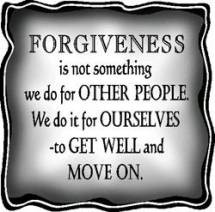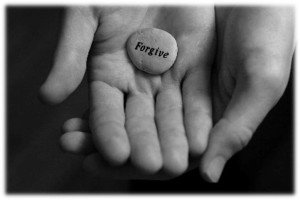
29 Sept 2013 by Lim Poh Ann –
When we forgive we are actually doing ourselves a favour.
"To forgive is to set a prisoner free and to discover the prisoner was you.” — Corrie Ten Boom
When Holland was under German rule during World War II, a brave Christian lady called Corrie Ten Boom hid several Jews who sought refuge in her home as they were being hunted down by the Nazis. But, betrayed by an informer, she was sent to a harsh concentration camp.
Much later, in post-war Germany, she met the prison guard in church. The latter, seeking forgiveness for the cruel things he had done in prison, asked, “Will you forgive me?” Though her heart was cold towards him, she knew forgiveness was an act of the will, not an emotion. Struggling hard, she forgave him. She had come to know God’s prerequisite for forgiveness—if we don’t forgive those who have wronged us, then God won’t forgive us (Matthew 6:14-15).
To forgive our enemies—and to bless and pray for them—goes against the grain of human nature. If God forgives us daily for our sins, how can we harbour bitterness against those who have hurt us? But only a deep experience of God’s unconditional love can empower us to forgive. It wasn’t easy even for a spiritual giant like Corrie.
Forgiveness is an act of obedience on our part in response to God’s word. It is not a feeling.Forgiving those who have wronged us, though difficult, is necessary to overcome our inner hurts and pain.
The world’s philosophy tells us to take revenge: You must get even. An eye for an eye, a tooth for a tooth. But we have to demolish such vindictive thoughts, taking them captive to obey Christ (2 Corinthians 10:5). We are told to put off the old nature, put on the new nature and be renewed in the spirit of our minds (Ephesians 4:22-24). By doing so, we do not allow anger to fester (Ephesians 4:26) or bitterness to take root (Hebrews 12:15).
It does not mean we condone the act of injustice inflicted upon us. But we forgive anyway. Forgiveness not only restores our relationship with the one who offended us but also restores our fellowship with God. We stand to benefit in other ways as well—physiologically and psychologically. When we forgive we are actually doing ourselves a favour.
When we align ourselves with God’s word—that we are to forgive as we have been forgiven by Christ—we will experience release and healing.
Compared to The Great Commission, healing of emotional wounds may not be a “big thing” as far as the church’s agenda is concerned. Nevertheless, it has a crucial role to play in setting God’s people free and moving them into their God-appointed destinies.
For the full article on INNER HEALING:
Source :
Porridge For The Soul By Dr Lim Poh Ann
http://limpohann.blogspot.com/
http://limpohann.blogspot.com/2013/09/release-through-forgiveness.html
Disclaimer: The views or opinions expressed by the columnists are solely their own and do not necessarily represent the views or opinions of Christianity Malaysia.com
References for pictures:
http://img.answcdn.com/view:feature/getty/Health/80d9eec7/156322906.jpg
http://beyoumediagroup.com/wp-content/uploads/2013/09/forgive-220×126.jpg
http://www.meditationtoday.com.au/wp-content/uploads/2013/09/forgive.jpg









This is a topic that’s near to my heart… Take care!
Exactly where are your contact details though?